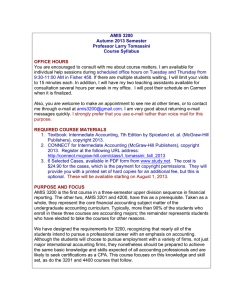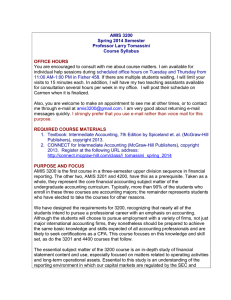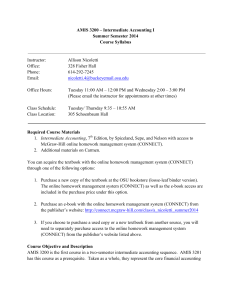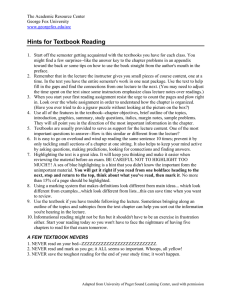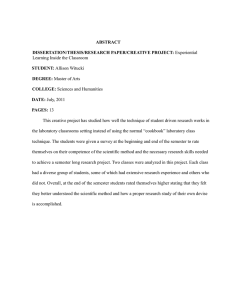AMIS 3200 – Intermediate Accounting I Summer Semester 2013 Course Syllabus
advertisement
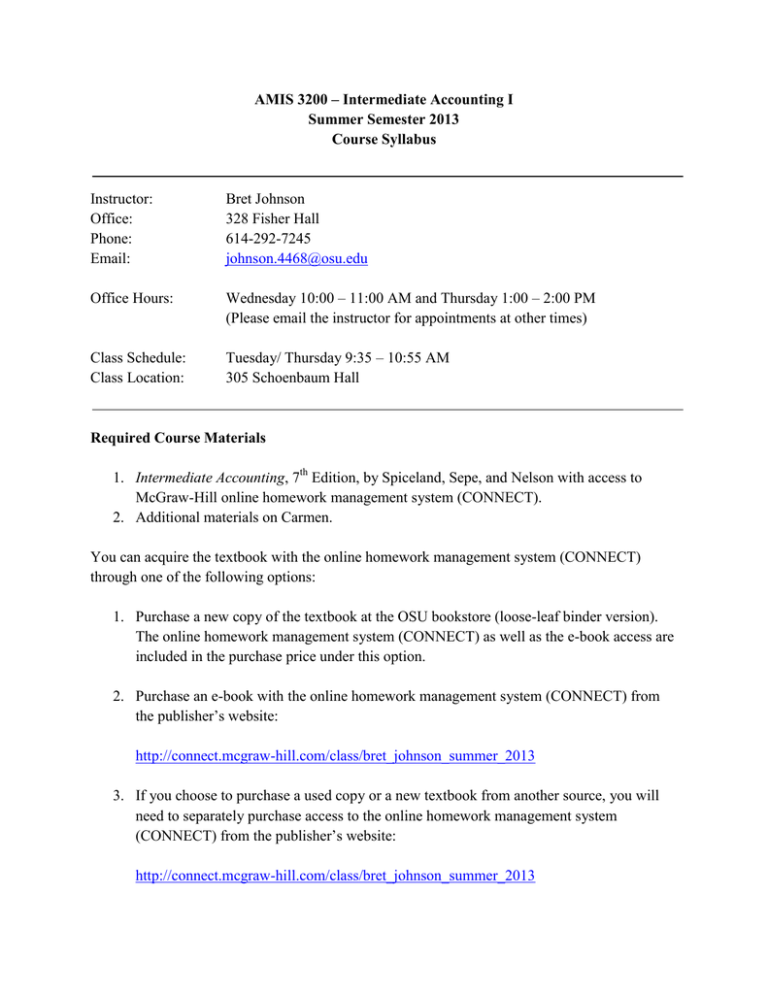
AMIS 3200 – Intermediate Accounting I Summer Semester 2013 Course Syllabus Instructor: Office: Phone: Email: Bret Johnson 328 Fisher Hall 614-292-7245 johnson.4468@osu.edu Office Hours: Wednesday 10:00 – 11:00 AM and Thursday 1:00 – 2:00 PM (Please email the instructor for appointments at other times) Class Schedule: Class Location: Tuesday/ Thursday 9:35 – 10:55 AM 305 Schoenbaum Hall Required Course Materials 1. Intermediate Accounting, 7th Edition, by Spiceland, Sepe, and Nelson with access to McGraw-Hill online homework management system (CONNECT). 2. Additional materials on Carmen. You can acquire the textbook with the online homework management system (CONNECT) through one of the following options: 1. Purchase a new copy of the textbook at the OSU bookstore (loose-leaf binder version). The online homework management system (CONNECT) as well as the e-book access are included in the purchase price under this option. 2. Purchase an e-book with the online homework management system (CONNECT) from the publisher’s website: http://connect.mcgraw-hill.com/class/bret_johnson_summer_2013 3. If you choose to purchase a used copy or a new textbook from another source, you will need to separately purchase access to the online homework management system (CONNECT) from the publisher’s website: http://connect.mcgraw-hill.com/class/bret_johnson_summer_2013 Course Objective and Description AMIS 3200 is the first course in a two-semester intermediate accounting sequence. AMIS 3201 has this course as a prerequisite. Taken as a whole, they represent the core financial accounting subject matter of the undergraduate accounting curriculum. Typically 90% or more of the students who enroll in these two courses are accounting majors. We have designed the requirements of 3200 recognizing that nearly all enrolled students intend to pursue a professional career with an emphasis in accounting. Although students will choose to pursue employment with a variety of firms, not just the major international accounting firms, they nonetheless should be prepared to achieve the same basic knowledge and skills expected of accounting professionals seeking certification as a CPA. The essential subject matter of 3200 is an in-depth study of financial statement content and use, especially focusing on matters related to operating activities and long-term operational assets. Essential to this study is an understanding of the reporting environment in which firms operate, including the regulatory environment of the capital markets and demand for audited financial information by capital providers and other market participants. Your learning of this material requires a highly disciplined routine, including reading and understanding key ideas, regular practice of accounting methods and techniques, and critical analysis of issues through which the knowledge is applied in practice. As students seeking to become professionals in the field, it is important that you also begin to follow the intellectual developments in the academic discipline of accounting. Much of today’s leading thinking about accounting policies and practice originated in the rigorous theorizing and empirical analysis that is the domain of academe. Although graduate degrees are the primary domain for such study, we introduce you to these issues in the undergraduate program. In addition to conceptual and technical knowledge, 3200 and 3201 are designed to build and exercise the essential skills of a professional accountant, particularly communication skills and professional research and inquiry skills. Employers, as well as professional and graduate schools, all seek candidates who have developed these skills so that they can be employed at the next level. Class Expectations This course demands a considerable amount of time and commitment. The effort will pay off in the near term as you prepare for more advanced financial accounting classes and other business courses, and in your long term career. 2 The course difficulty builds rapidly throughout the semester. If you feel shaky about the basics of accounting, please review your class notes from the introductory courses now. The best way to learn accounting is to practice on your own. Just like watching an instructor doing push-ups will not help you get stronger, you have to put in the practice time yourself. Set a routine, and work consistently throughout the semester. Don’t be afraid to learn from your mistakes. Finally, regular class attendance is important. If you miss a class, it is your responsibility to ensure that you understand the material covered that day. Grades Your overall performance in the course will be weighted as follows: Midterms (250 each) Final Exam Group Projects (100 each) Total Maximum Points 500 300 200 1,000 Using the above components, the overall grades will be based on the following scale: A: 900 points or above A-: 870-899 points B+: 840-869 points B: 800-839 points B-: 770-799 points C+: 740-769 points C: 700-739 points C-: 670-699 points D+: 640-669 points D: 600-639 points E: Below 600 points These grade cutoffs are strictly and fairly applied to everyone. There will no “curve” applied to component scores. There will be no extra credit opportunities other than the five bonus points for emailing the information for the picture roster as discussed below. 3 Exams There will be two in-class midterm exams and one cumulative final exam. Excused absences on exam days require advanced approval and documentation such as a doctor’s note that you are physically unable to sit for the exam or an obituary for an immediate family member’s funeral. The exam dates will be as follows: Exam 1: Tuesday, June 11, 2013 Exam 2: Tuesday, July 18, 2013 Cumulative Final Exam: Monday, July 29, 2013 10:00 – 11:45 AM in the classroom. You are required to have a basic four-function calculator for the exams. Programmable/ financial calculators or those with extensive memory functions are not acceptable. Group Projects There are two case studies that are to be completed in groups of two or three students. Each group will hand in one write-up for each project. I will provide more information about the content and due dates of the group projects on Carmen. Homework We will be using an online homework management system affiliated with the textbook to assign homework practice problems. Please go to the following website and log on with your 20-digit access code: http://connect.mcgraw-hill.com/class/bret_johnson_summer_2013 Homework problems are not graded, but are designed to provide feedback and additional practice. You may work on the homework exercises in groups or individually. If you use the online homework system, please submit your answers for diagnostic purposes. Class Roster and Seating Chart In an effort to learn your names, and encourage class participation, I will compile a picture roster of the class. Please email me by May 13, 2013 with a recent photograph and your complete and preferred name. Those who email me with this information by May 13th will receive 5 bonus points. There will be no other opportunities for extra credit in this course. 4 I will use a seating chart, which will be determined on the 2nd class session (May 9th) so please choose where you would like to sit for the semester by then. Practical Tips If I were a student in this class, I would read the assigned portions of the Chapter prior to each class session. I would work through the suggested homework practice problems and review the lecture materials and textbook related to the areas that were most difficult. I would form a studygroup, not only to receive help on difficult concepts and problems, but to practice explaining the concepts to others in order to solidify my own understanding. I would then prepare for each exam by reviewing the class notes and assigned practice problems. Wait List Students Students who are waitlisted and wish to enroll must attend class through the first class session of the second week of the semester. After that date, students who have not been added will not be enrolled and may not continue to attend the class. Waitlisted students should contact either the Fisher Undergraduate Program Office or the Department of Accounting and MIS office if they have any questions regarding the waitlist process. Disenrollment University Rule 3335-8-33 provides that a student may be dis-enrolled after the third instructional day of the semester, the first Friday of the semester, or the student’s second class session of the course, whichever occurs first, if the student fails to attend the scheduled course without giving prior notification to the instructor. As there is often a waitlist for this course, I will follow these guidelines without exception. Academic Misconduct Academic misconduct will not be tolerated. According to University Rule 3335-31-02, all suspected cases of academic misconduct will be reported to the Committee on Academic Misconduct. Students with Disabilities If you have a certified disability that is approved for accommodations by the Office for Disability Services, please notify me so I can provide the necessary accommodations. If you have not previously contacted the Office for Disability Services, I encourage you to do so as soon as possible. 5 Communication Class announcements and updates will be made on the course webpage on Carmen continually throughout the semester, so please check the course webpage frequently (especially before each class). Please contact me for needed assistance with the course material. Email is my preferred method of being contacted. If the question is easier answered in person, please stop by during my office hours, or email an alternative meeting time. 6

